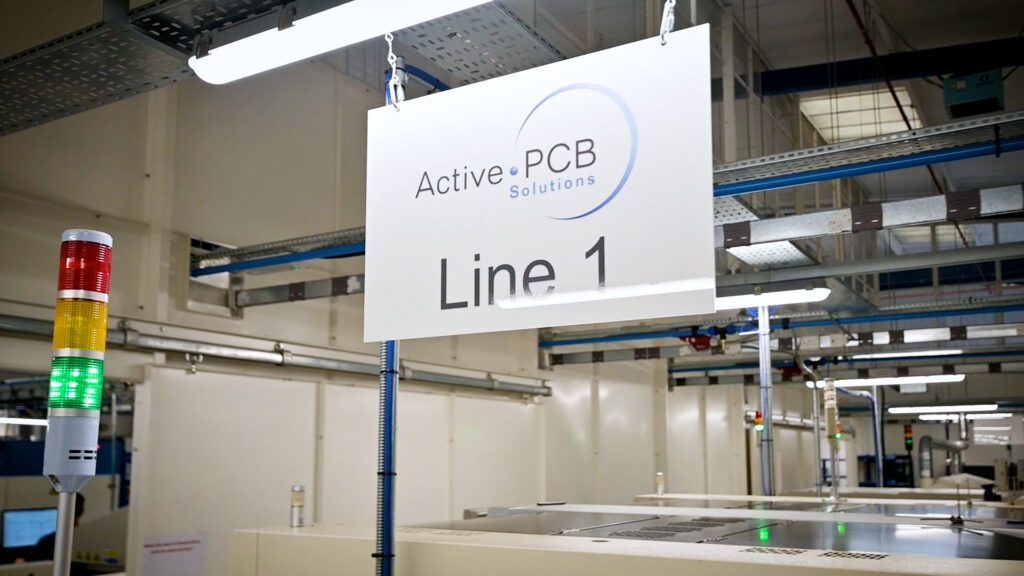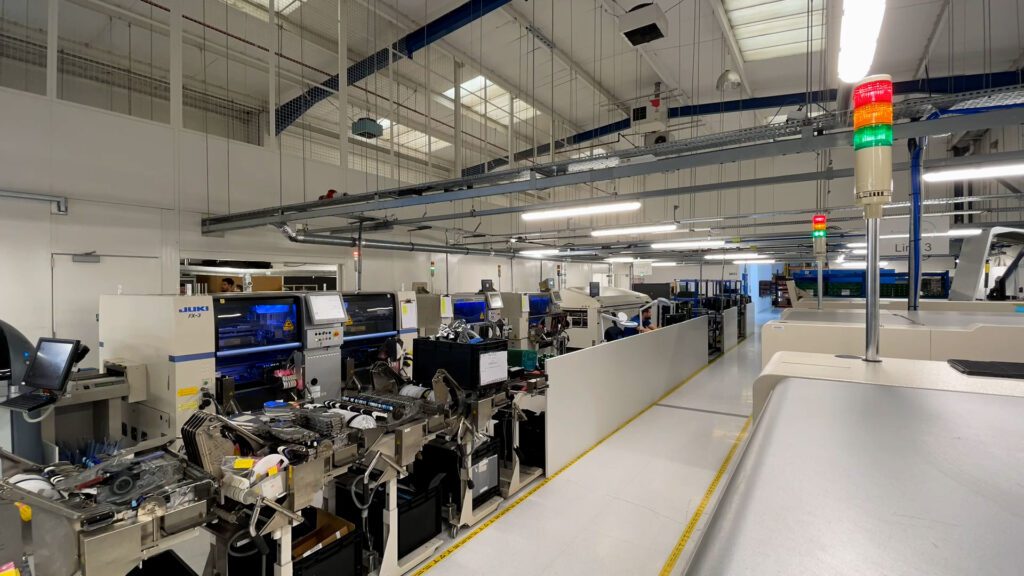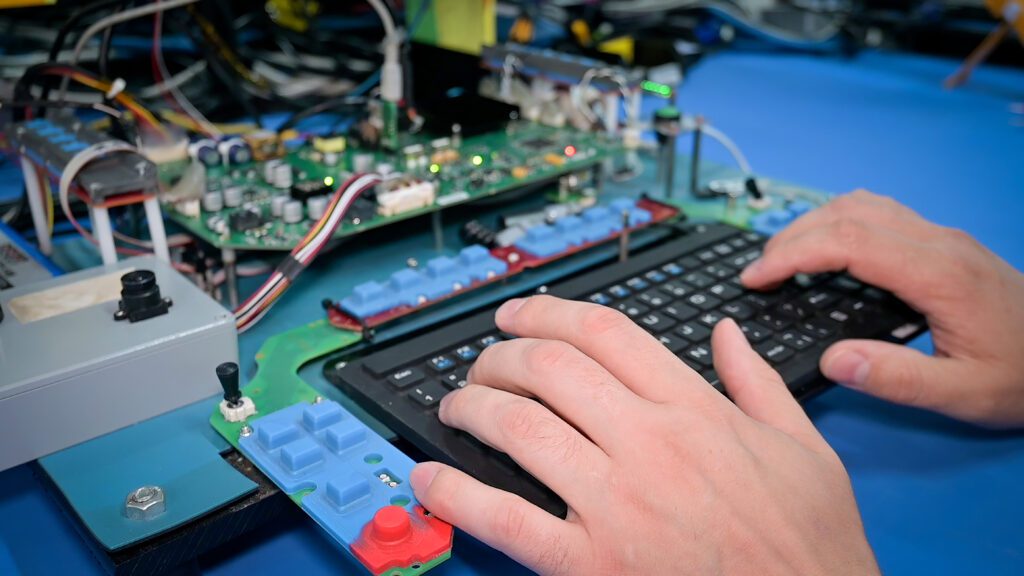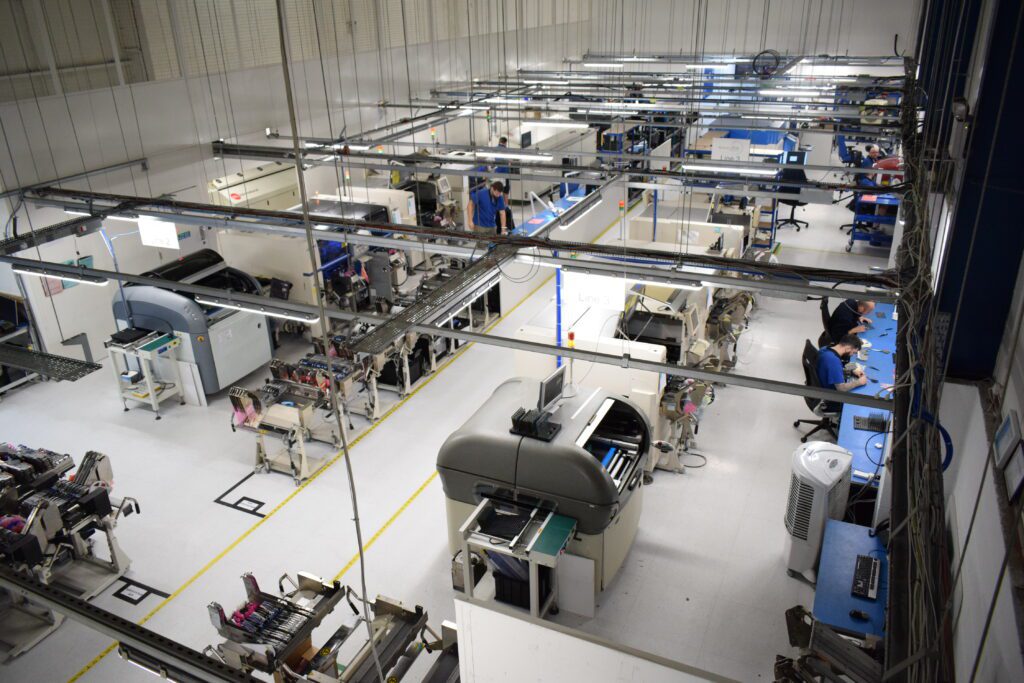When developing electronic products for the market, businesses must decide whether to manufacture them in-house or partner with an established Electronics Contract Manufacturer, such as Active-PCB Solutions, to take on the production element.
Each approach has benefits and drawbacks, with the right choice depending on numerous factors such as production volume, cost, expertise, and scalability. In this article, we’ll analyse the pros and cons each, consider when outsourcing may be the best option, and uncover hidden costs associated with in-house production.
Cost-Benefit Analysis of Electronics Contract Manufacturing vs. In-House PCB Assembly

Electronics Contract Manufacturing: Benefits & Costs
Benefits:
- Lower Initial Investment: Electronics Contract Manufacturing providers already have the infrastructure, equipment, and expertise, eliminating the need for expensive capital investment.
- Access to Advanced Technology: As it is their daily business, Electronics Contract Manufacturing partners have to continuously upgrade their manufacturing facilities to meet and exceed industry standards.
- Scalability: Electronics Contract Manufacturing allows businesses to scale production quickly without major infrastructure expansion.
- Focus on Core Competencies: Outsourcing frees up resources to focus on R&D, marketing, and business development.
- Regulatory Compliance & Quality Control: Electronics Contract Manufacturing providers often hold certifications which ensure quality and compliance.
- Supply Chain & Component Sourcing: Electronics Contract Manufacturers have established supplier relationships, leading to better unit pricing and shorter lead times.
Costs:
- Per-Unit Manufacturing Costs: Electronics Contract Manufacturing pricing will include service fees and a margin of profit, potentially increasing per-unit costs compared to in-house production.
- Less Direct Control: Companies must rely on an external partner for production, quality assurance, and delivery timelines. If you have excellent communication then this can lessen the negative impact.
- Intellectual Property Risks: There may be concerns about protecting proprietary designs when outsourcing manufacturing. This risk can be mitigated by using a trustworthy and well respected manufacturer with a good and established reputation.
In-House PCB Assembly: Benefits & Costs
Benefits:
- Full Control Over Production: Companies have direct oversight of manufacturing, quality control, and scheduling.
- Potential For Faster Iterations: Engineering and production teams can work closely to make quick design modifications.
- Cost Savings for High-Volume Production: If demand justifies the initial investment, long-term per-unit costs can be lower.
Costs:
- High Capital Expenditure: Setting up an in-house production facility requires significant investment in machinery, cleanrooms, and skilled labour.
- Maintenance & Upgrades: Ongoing costs for equipment calibration, repairs, and technological upgrades.
- Skilled Workforce Requirement: Hiring and training skilled technicians add to operational expenses.
- Supply Chain Management: Companies must source and manage components, which can lead to procurement delays and fluctuating costs.

When to Consider Outsourcing to an Electronics Contract Manufacturer
While in-house manufacturing provides control, many businesses find Electronics Contract Manufacturing to be the superior choice in the following situations:
- Startups & Small Businesses: Limited resources make it difficult to invest in an in-house facility.
- Medium-to-Large Enterprises Scaling Up: Rapid growth requires flexible manufacturing capabilities that Electronics Contract Manufacturers provide.
- Complex & Highly Regulated Industries: Electronics Contract Manufacturers specialise in industries like medical, aerospace, and automotive, where certain accreditations are required and compliance is critical.
- Prototype to Mass Production Transition: Electronics Contract Manufacturers help businesses transition smoothly from prototyping to high-volume production.
- Cost Optimisation: When in-house costs exceed Electronics Contract Manufacturing pricing due to labour, equipment, and component sourcing challenges.
The Hidden Costs of In-House Production
Many companies underestimate the hidden expenses associated with in-house PCB assembly, including:
- Downtime & Maintenance: Equipment failures or production bottlenecks can lead to costly delays.
- Inventory Management: Holding excess components and raw materials ties up capital.
- Regulatory & Compliance Costs: Meeting industry standards requires audits, certifications, and documentation, all of which require resources.
- Labour Costs & Training: Recruiting, training, and retaining a skilled workforce can be expensive.
- Technology Upgrades: Advancements in manufacturing technology may require frequent investments in new equipment.
Ultimately, deciding between Electronics Contract Manufacturing and in-house production depends on your business’s size, budget, and long-term goals. Electronics Contract Manufacturing is ideal for companies looking to minimise capital investment, scale efficiently, and ensure high-quality production. In-house manufacturing works best for businesses with the resources to invest in infrastructure who wish to maintain complete control over the production process.
Need a Reliable Electronics Contract Manufacturer?
Active-PCB Solutions specialises in high-quality electronics manufacturing services tailored to your needs. Contact us today to explore how we can help optimise your production process!


